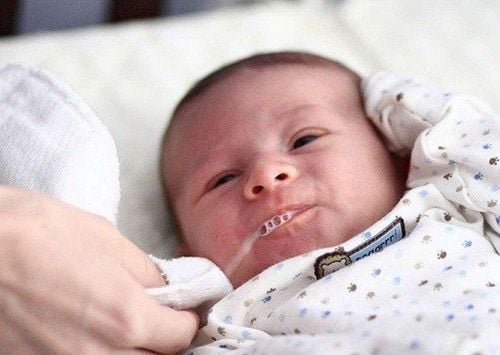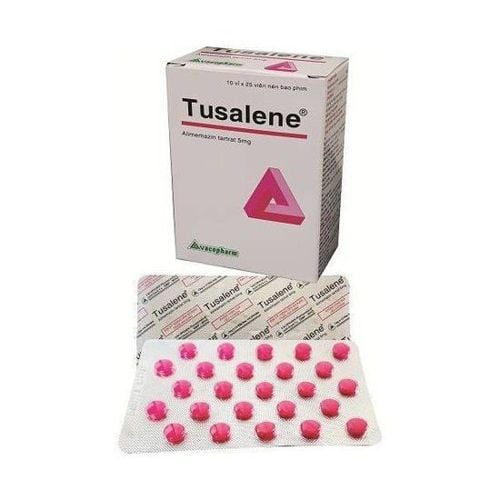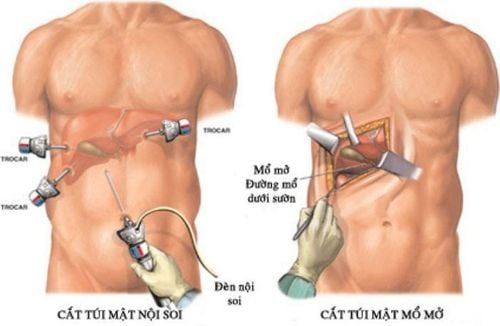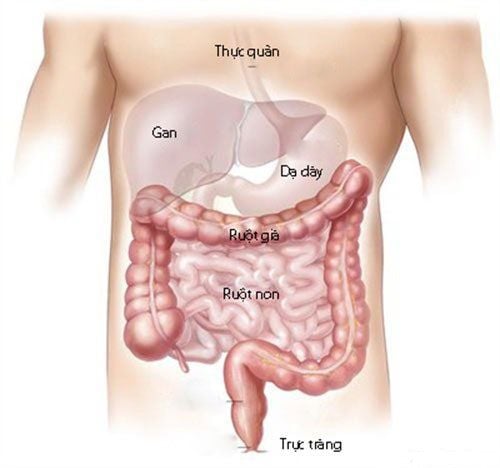This is an automatically translated article.
The article is professionally consulted by Master, Doctor Ngo Thi Oanh - Pediatrician - Pediatrics - Neonatology - Vinmec Ha Long International General Hospital.
Vomiting is a very common symptom in children, this can be a sign of an acute illness. This is the period when your baby's body is adjusting to foods. So, what are the normal or abnormal signs of vomiting in children?
1. Why do children vomit?
Vomiting is a phenomenon in which the abdominal muscles and chest wall muscles contract and push the contents of the stomach up into the esophagus and out into the mouth. This phenomenon occurs when the nerves of the brain become more sensitive to stimuli such as: food poisoning, infections, drugs, movement,...
This is a beneficial and It is the body's way of removing harmful substances from the body quickly. However, absolutely should not use drugs or use fingers to pick up vomiting even if children mistakenly drink harmful substances.

Ngộ độc thức ăn có thể là nguyên nhân gây nôn ói ở trẻ.
2. Causes of vomiting in children
Causes of vomiting in young children often depend on age:
Age < 12 months old
Children younger than 1 year old often find it difficult to distinguish between vomiting, gastroesophageal reflux disease or another medical condition. . When children vomit a lot, they can think of diseases such as: pyloric obstruction or stenosis, intussusception, intestinal obstruction, etc. Therefore, parents need to take their children to the doctor for early diagnosis and treatment. .
If your child's vomiting is accompanied by a fever (38 degrees Celsius or higher) it may be due to a bowel infection or an infection somewhere in the body.
Age > 12 months old
The most common cause of vomiting in this age group is viral gastroenteritis. Symptoms usually begin suddenly and resolve within 24-48 hours, and may be accompanied by diarrhea, fever, or abdominal pain.
Vomiting caused by children eating contaminated food, holding hands or sucking contaminated objects (with bacteria or toxins of bacteria, molds) leading to poisoning.
There are also some other causes such as: Gastroesophageal reflux, gastric ulcer, duodenal ulcer, intestinal obstruction, intussusception, respiratory tract infection, urinary tract infection, nervous system infection central, appendicitis, pancreatitis,...

Tắc ruột gây nôn ói ở trẻ nhỏ.
3. Children vomiting with what signs is normal?
In the early stages of a child's life, vomiting is very normal and common because the baby is gradually adapting to the taste of food, the organs also need time to "harmonize" with the foods. products that your baby takes in every day.
Children vomiting with what signs is normal? Parents need to know how to distinguish between vomiting and regurgitation. Vomiting is all the food that has been eaten by the baby, while regurgitating milk contains only a small amount of food and is often accompanied by heartburn symptoms.
After eating, the baby may spit milk a little, however, this situation will reduce if the baby does not play around after eating and spitting milk usually does not affect the baby's weight gain.

Nếu trẻ bị ọc sữa thì là chuyện bình thường.
4.Children vomiting with any signs is not normal?
Newborn vomiting . Vomiting and signs of dehydration (dry mouth, dry eyes, no urine for 6 hours). Children with vomiting accompanied by fever over 38 degrees Celsius for more than 3 days or as soon as the child has a fever > 39 degrees Celsius, cold hands and feet. Do not drink milk. Vomiting continuously for longer than 24 hours. Shortness of breath. Heart beats fast. Drowsy, drowsy, lethargic. Vomiting blood. Vomiting green bile. Diarrhea with blood. Accompanying diarrhea is usually due to pyloric stenosis, urinary tract infection, ear infection, etc. Abdominal pain.

Trẻ nôn ra máu cần ngay lập tức đưa đi bệnh viện.
5. Taking care of children with vomiting
Watch for dehydration
Dehydration can occur when a child vomits and vomits with signs including:
Dry lips. Thirsty. Crying without tears. Do not urinate for 6 hours. Two sunken eyes. Cold hands and feet. Languid. Diet
Feed the baby easily digestible foods, breast-feed with the nursing baby if there are no signs of dehydration. Breast milk is very easy to digest, if your baby vomits right after feeding, you should try to breastfeed little by little and many times. If after 2-3 hours, the vomiting gradually subsides and stabilizes, you can breastfeed as usual or vice versa, take the baby to the doctor immediately. Do not force children to eat, especially in the first 24 hours, you can give them porridge, lean meat, yogurt, fruit, ... and limit fat that causes difficulty in digestion. There is no need to restrict foods. Rehydration and electrolytes
Oresol solution helps to replace fluids and electrolytes (sodium, potassium, chloride) lost during vomiting and diarrhea. Oresol does not induce vomiting and does not treat vomiting, but only prevents and treats dehydration caused by vomiting. Prepare Oresol properly and monitor closely for symptoms of more severe dehydration.
Juice, rice water and other beverages (mineral water containing electrolytes, water with a lot of sugar) are not recommended for children when they are dehydrated. For children to drink Oresol in small sips, every 1-2 minutes, should take a full amount of Oresol (50ml per kg of weight) within 4 hours and then let the child eat and drink normally.
Give your baby a rest
When the baby sleeps, the stomach and intestines will be less irritated so it is advisable to keep the baby sleeping well so that the baby gets better quickly. Limit odors and irritating odors (perfume, smoke, ...), limit bright light shining on children or limit rides that cause nausea.
On the other hand, parents absolutely do not arbitrarily give their children anti-vomiting drugs. If the child is over 2 years old, you can mix warm ginger water and give it to your baby to drink little by little.
Prevention of spread
In case the child's vomiting is caused by a virus or other contagious bacteria, adults should be careful when taking care of the child. It is important to wash your hands often and limit your child's contact with many people until the child has stopped vomiting for 24 hours.
In summary, vomiting in young children in the early stages of life is a common phenomenon and does not affect the health and development of the children. Parents should not be too stressed when they see their children vomit or vomit, instead need to adjust their feeding habits and diet more appropriately. However, when an adult child vomits suddenly or for a long time, accompanied by pathological symptoms, it is necessary to take the child to the doctor for timely treatment.
In Vietnam today, 7 out of 10 children under 5 years old have zinc deficiency and 8 pregnant women have zinc deficiency. The prevalence of zinc deficiency in pregnant women is 80.3%, women of childbearing age 63.6% and children under 5 years old is 69.4%. The most common manifestations of zinc deficiency in children are growth retardation, mild and moderate malnutrition, delayed growth in height, and some observable symptoms such as anorexia or decreased appetite, decreased suckling, and no meat. fish, slow digestion, mild constipation, persistent nausea and vomiting in children. In addition to reasonable zinc supplementation, parents also need to provide their children with other important vitamins and minerals such as lysine, chromium, B vitamins,... resistance to minor illnesses and less digestive problems.
Please visit the website vimec.com regularly and update useful information to take care of your baby and family.













